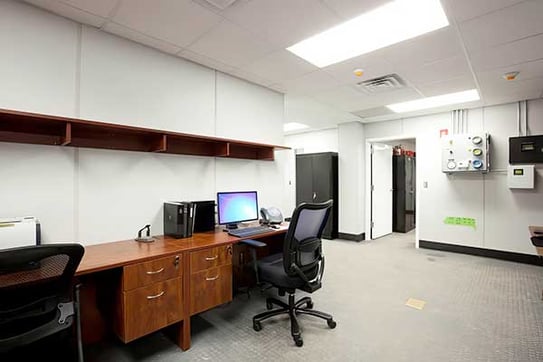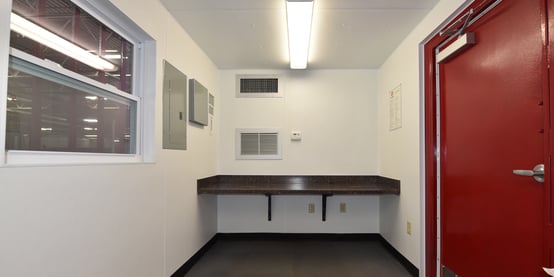mobile offices: container or trailer? the choice is clear
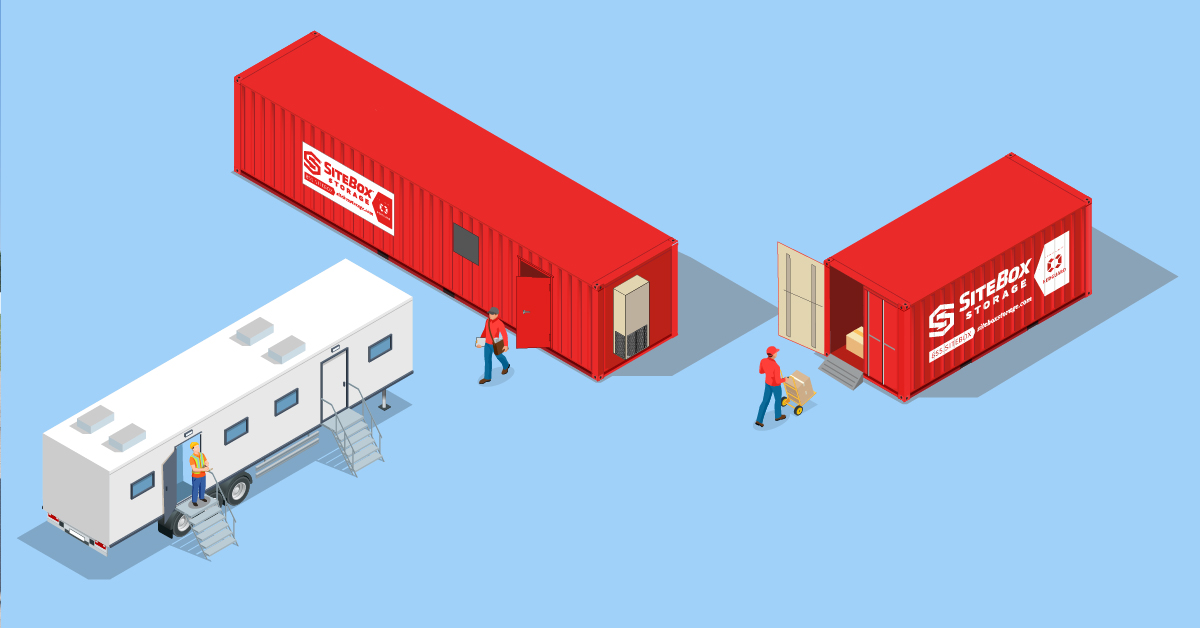
Your jobsite needs office space, but a permanent building either isn't built yet or isn't in the plans. What do you do?
Do some jobsite planning that includes a mobile office.
Now the next question: ground-level container-based office or an office trailer? That's also an easy decision if you ask us. Ground-level wins every time.
At SiteBox Storage, we only build ground-level mobile offices for a reason. As an industry leader in mobile workspace solutions, we've worked with hundreds of customers throughout Maryland, New Jersey, New York, Baltimore, and beyond. We've seen repeatedly how ground-level container-based offices outperform traditional office trailers.
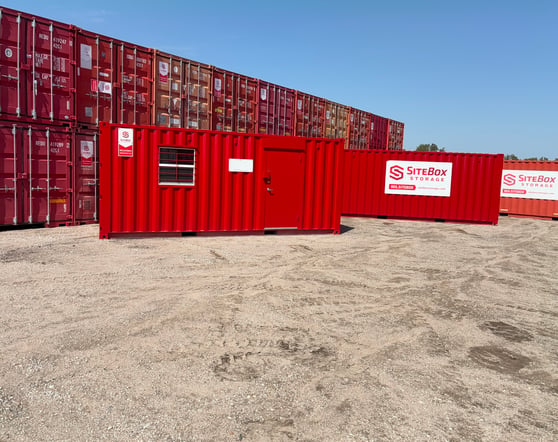
We only offer products we genuinely believe in.
Understanding the Basic Difference
Ground-level mobile offices are all-steel modular structures built from modified shipping containers. They're delivered to your site and sit directly on the ground with minimal prep. These workspace solutions feature HVAC systems with heat and air conditioning, lighting, reinforced windows, steel doors with security locks, and insulation in walls and ceiling.
Office trailers are built on a rolling chassis and towed to your jobsite by truck. They sit above ground level and require stairs for access. These mobile offices feature desks, furniture, and climate control. Exteriors are usually finished in paneled vinyl rather than steel.
Both provide temporary workspace for construction sites, government projects, and various industries needing flexible facilities. But how they're built and deployed makes a huge difference.
Types of Mobile Office Containers
Container-based mobile offices come in 10-foot, 20-foot, and 40-foot models matching standard shipping container sizes. The 10-foot units work when space is tight. The 20-foot containers are most popular—enough room for desks and small teams. The 40-foot models provide serious space for larger operations.
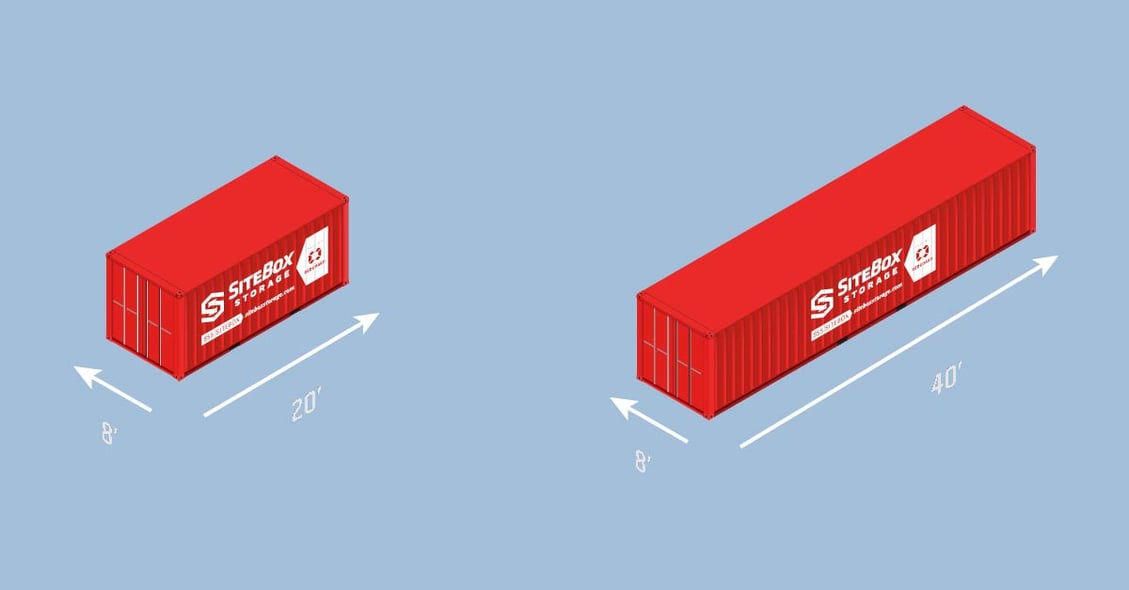
Combination units split space between office and storage. Half is workspace with furniture and climate control, half stores tools or materials. One unit, two functions.
Custom configurations let you specify exact layouts, furniture arrangements, and features. The variety means you pick what works instead of settling for generic options in stock.
Features of Office Trailers
Office trailers include desks and furniture for multiple people. Electrical systems power computers and equipment. HVAC provides heat and air conditioning year-round. Lighting keeps workspace functional.
Exteriors are typically vinyl siding. Windows let in natural light. Doors provide access, though security varies by model and price.
Interior finishes often look like traditional offices—drop ceilings, finished walls, carpet or vinyl flooring. Storage space exists but is more limited than container combination units.
The permanent chassis underneath affects setup and long-term durability compared to solid steel container construction.
Benefits of Ground-Level Mobile Office Solutions
Ground-level container offices sit right on the ground—no stairs required. With trailers, you must install OSHA-approved stairs, adding expense and hassle. After a long workday, nobody wants climbing stairs just to reach the office.
Container offices are more durable. Built entirely from steel, they stand up to any environment. With trailers, wear and tear from moving reduces lifespan to just a couple years. Ground-level offices last decades.
Mobile office containers provide greater protection. All-steel construction protects belongings way better against theft. Steel resists pests and weather year-round better than vinyl-sided trailers.
Ground-level containers are safer. Stairs create tripping hazards requiring OSHA approval. Ground-level access eliminates that risk.
Transport is easier with containers despite trailers having wheels. Expert delivery positions ground-level offices with pinpoint accuracy without needing heavy equipment.
Customization Options for Your Workspace
With container-based offices, you specify exactly what your business needs. Interior layout can be open floor plan, separate offices, meeting spaces, or break areas. Walls create divisions for different purposes.
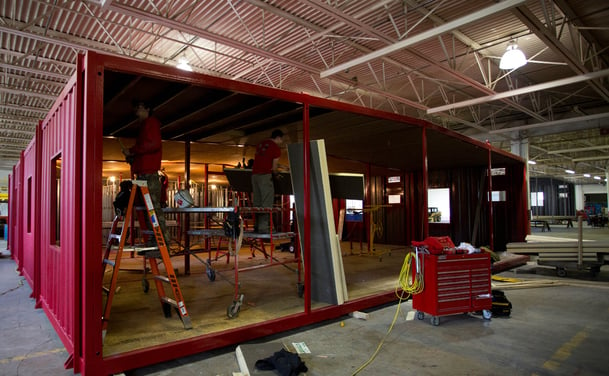
Furniture and desks come in various configurations. Some suppliers deliver fully furnished. Others let you specify exact pieces—desk models, chairs, filing cabinets, shelving.
Climate control specifications matter for different regions. Over 65% of mobile office containers come with energy-efficient HVAC systems. Confirm specifications for your location.
Security features can be upgraded—better locks, reinforced doors, security bars, alarm systems. Government projects or sites with expensive equipment might need enhanced security.
Exterior options include colors, logos, branding, access ramps, awnings, and lighting. Storage solutions inside range from basic shelving to specialized racks.
Customization level depends on rental versus purchase, but good companies work with you on specifications.
Installation and Setup Process
Setup speed is a major advantage. Approximately 72% of construction sites in the US use mobile office trailers for on-site management because deployment is fast. Mobile office containers reduce setup time by around 43% compared to traditional buildings.
For ground-level containers, the supplier delivers on a specialized truck and positions it where you want it. Containers sit directly on prepared ground—just needs to be level. No foundation required typically.
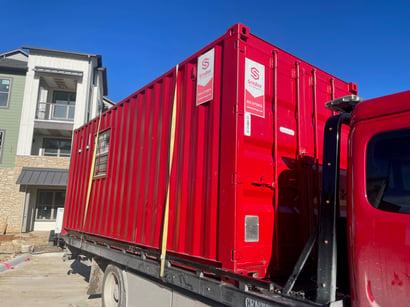
Utility connections follow—electrical, internet, phone lines. Climate control systems just need power. The whole process from delivery to operational workspace takes hours, not weeks. Compare that to traditional construction taking months.
Trailers need positioning, leveling on chassis, and installing OSHA-approved stairs. That's additional time and cost versus ground-level deployment.
Relocation is easy when projects move. The supplier returns with a truck, loads the container, transports it, and deploys at the new location.
Mobility and Flexibility Advantages
The transportable nature provides flexibility permanent structures can't match. Container-based offices move easily between locations. Professional transportation teams handle logistics—you don't deal with complexity.
For businesses operating in multiple regions like Maryland, New Jersey, or New York, this mobility means one unit serves multiple projects over time. Construction companies move offices between job sites. Government contractors relocate as contracts change.
The adaptable nature extends beyond physical movement. Rental agreements often allow flexible terms matching your project timeline rather than rigid contracts.
Scaling becomes simple. Need more workspace? Rent additional units. Project wrapping up? Return units. This efficiency helps manage costs without over-committing to facilities.
Leasing options provide middle ground between rental and purchase. The variety of arrangements accommodates different business situations.
Durability and Weather Resistance
Ground-level container offices win on durability. All-steel construction handles whatever weather you throw at it. Rain, snow, heat, wind—steel shipping container offices resist elements year-round without vinyl deterioration.
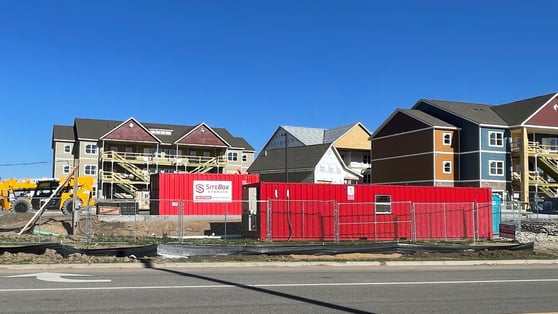
Insulation in walls and ceiling keeps interiors comfortable while protecting against temperature extremes. Quality units handle climates from freezing winters to scorching summers.
Steel doors and reinforced windows provide security while standing up to weather. Unlike wood or vinyl that warp or crack, steel maintains structural integrity over time.
For portable offices that move between locations, durability becomes critical. Steel containers handle transport stress far better than trailers built on chassis with vinyl exteriors. Container offices last decades while trailers often need replacement after a couple years.
Pest resistance is another benefit. All-steel construction keeps out rodents and insects. Maintenance stays minimal—steel doesn't need painting or siding replacement that trailers require.
Cost Considerations and Pricing
Understanding the full price picture helps you compare options properly. Purchase prices for mobile office containers vary based on size, features, and customization. Basic 20-foot units start in the tens of thousands. Larger 40-foot models with extensive features cost more. Get quotes from suppliers for exact requirements.
Rental offers lower upfront expense. Monthly rates depend on size and features but provide workspace without major capital investment. This works for temporary projects or businesses testing mobile solutions.
When comparing containers to trailers, factor total cost of ownership. Trailers might seem cheaper initially, but shorter lifespan means replacement costs. Container durability means one purchase serves many years across multiple projects.
Setup costs differ. Ground-level containers need minimal site prep. Trailers require stairs installation—additional expense. Over time, those costs add up if you're moving offices regularly.
The global market for mobile office units is projected to grow by 6.8% annually through 2027. Consider rental versus purchase based on your situation. Short-term? Rent. Long-term or repeated use? Purchase makes sense.
Common Uses and Applications Across Industries
Mobile office containers serve tons of industries beyond construction. About 72% of construction sites use mobile offices for project management and site coordination. Supervisors need workspace for plans, computers, and managing teams where work happens.

Government projects use portable offices for infrastructure work, public projects, or disaster response. Events and entertainment industries rent them for festivals, concerts, or sporting events—ticket booths, administrative spaces, security stations.
Retail and sales operations set up temporary locations at markets or seasonal operations. Education facilities use them during construction when administrative staff need temporary workspace. Manufacturing sites place them for supervisors at remote locations.
Energy and utilities sectors use mobile offices at remote work sites—power plants, pipeline projects, drilling operations. The average size of an office trailer is about 33.7 square meters, accommodating several people for most applications.
The range of applications keeps expanding as more businesses discover mobile solutions work better than traditional approaches for temporary situations.
Maintenance and Upkeep Requirements
Proper maintenance keeps mobile offices functional for years, but requirements differ between containers and trailers.
Ground-level container offices need minimal upkeep. Steel construction resists weather and wear. Basic maintenance includes keeping exteriors clean, checking door seals and locks, inspecting windows, and ensuring drainage stays clear. HVAC systems need filter changes and annual servicing.
Interior maintenance depends on use. Keep workspace clean. Address damage promptly. Treat it like any office.
Trailers require more maintenance because of construction and chassis underneath. Vinyl siding needs repairs as it deteriorates. The trailer frame and wheels need inspection. Additional complexity means more potential issues and higher costs over time.
When renting, maintenance responsibilities vary by agreement. Many rental companies handle major maintenance. For purchased units, all maintenance is yours. Quality steel containers last decades with basic care—less frequent repairs and lower long-term expenses versus trailers.
Frequently Asked Questions
What are mobile office containers? Mobile office containers are portable workspace solutions built from modified shipping containers with steel construction. They include desks, climate control, lighting, and furniture for temporary or relocatable office space.
How do office trailers work? Office trailers are mobile offices built on a rolling chassis that gets towed to your location, unhooked, and leveled. Stairs provide access since trailers sit elevated. They include standard office features like desks, electricity, HVAC, and furniture.
Can I rent a mobile office container? Yes, rental is popular for temporary projects. Rental agreements offer flexible terms matching your project timeline. Monthly rates vary by size and features. Many suppliers in Maryland, New Jersey, New York, and Baltimore offer rental programs.
What sizes do office trailers come in? Office trailers typically come in 10-foot, 20-foot, and 40-foot lengths. The average size is about 33.7 square meters. Width is standard at 8 feet. Larger sizes provide more workspace for bigger teams.
Are mobile offices insulated for different climates? Yes, quality mobile offices include insulation in walls and ceiling. Over 65% are equipped with energy-efficient HVAC systems providing heat and air conditioning. Verify insulation specifications for your region.
How much does an office trailer cost? Costs vary based on size, features, and rental versus purchase. Rental rates range from a few hundred to several thousand monthly. Purchase prices start in tens of thousands. Get specific quotes for accurate pricing.
What amenities do mobile office containers include? Standard amenities include electrical outlets, HVAC climate control, lighting, reinforced windows, steel doors with security locks, desks, and basic furniture. Optional additions include upgraded furniture, enhanced security, and storage solutions.
How long does delivery take for office trailers? Delivery typically happens within days to weeks depending on availability and location. Standard units ship fastest. Once delivered, setup happens quickly—often same day for ground-level containers.
Can mobile offices be customized? Absolutely. Customization options include interior layout, furniture selection, accessories, security upgrades, exterior colors or branding, and specialized features. Level depends on rental versus purchase.
Where can I buy or rent an office trailer? Through mobile office suppliers serving your region. SiteBox Storage operates in Maryland, New Jersey, New York, and Baltimore. Search for "mobile office rental" or "shipping container offices" plus your location.
Making the Right Choice for Your Business
Ground-level container-based mobile offices are more durable, safer, provide greater protection, and are easier to move than office trailers. The all-steel construction, ground-level access, and long-term reliability make them the better solution for most businesses and projects.
If you want to learn more about units available through SiteBox Storage, contact us today for a quote. We'll discuss your specific needs and help you select the right mobile office solution.
Whether you need workspace for construction sites, government projects, temporary facilities, or any application requiring flexible solutions, container-based mobile offices deliver performance trailers can't match. The choice is clear when you compare options side by side.
Don't settle for trailers with stairs, shorter lifespans, and vinyl construction. Get ground-level steel containers that work better, last longer, and provide safer workspace for your team.
If you want to learn more or are interested in finding out about the units available at SiteBox Storage, contact us today. Or, read more on our blog about how useful mobile offices can be.

